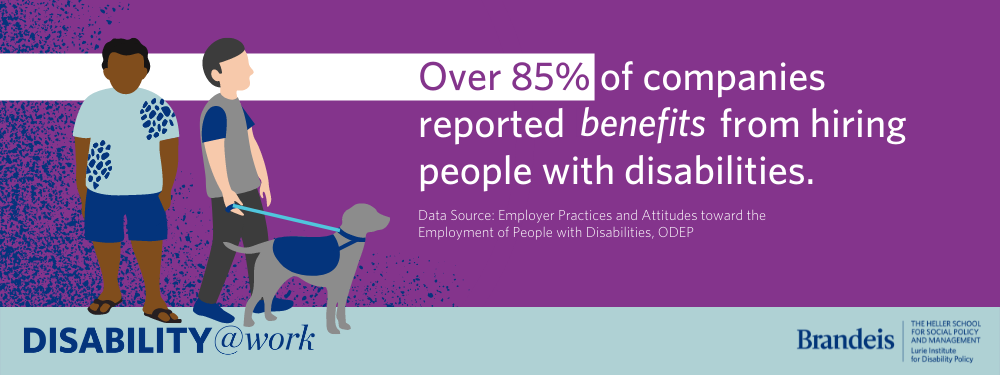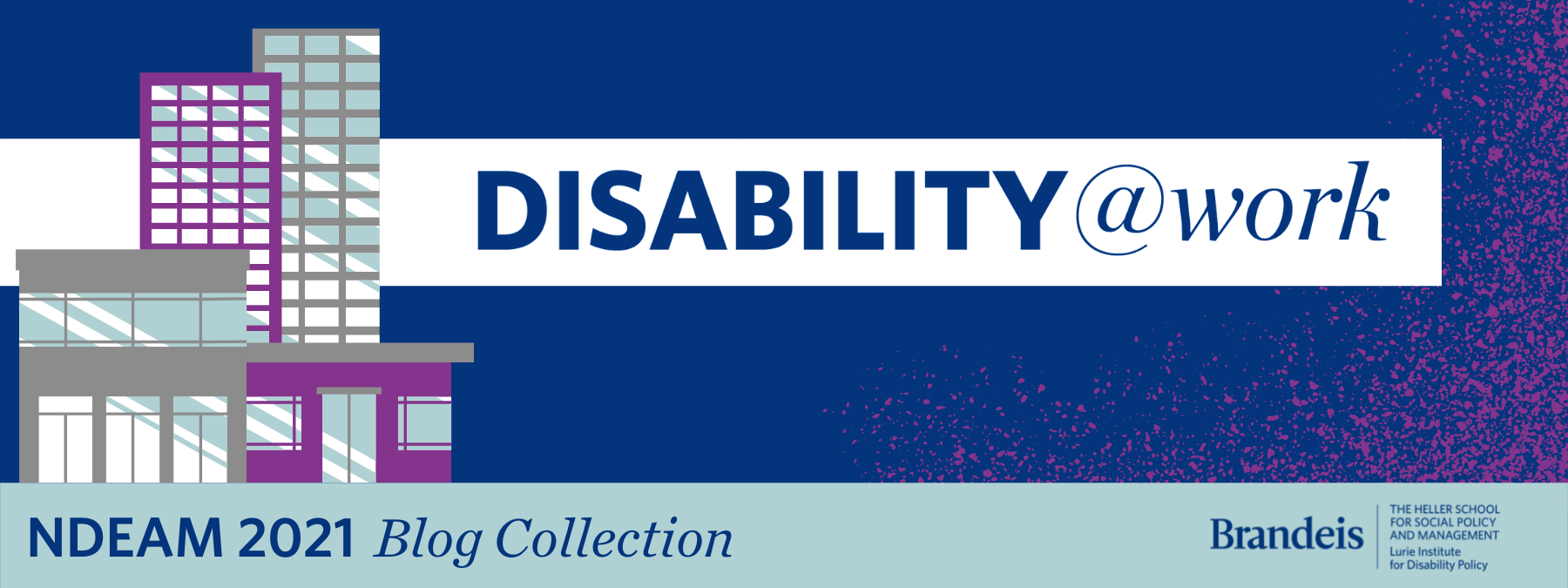 October is National Disability Employment Awareness Month, or NDEAM. Every year, the Lurie Institute observes NDEAM to honor the participation of disabled people in employment in all fields and occupations and to celebrate their contribution to our shared social and economic life. NDEAM theme for 2021 was "America’s Recovery: Powered by Inclusion."
October is National Disability Employment Awareness Month, or NDEAM. Every year, the Lurie Institute observes NDEAM to honor the participation of disabled people in employment in all fields and occupations and to celebrate their contribution to our shared social and economic life. NDEAM theme for 2021 was "America’s Recovery: Powered by Inclusion."
In honor of NDEAM, the Lurie Institute for Disability Policy and its two federally funded centers, the National Research Center for Parents with Disabilities and the Community Living Policy Center, invited blog or video blog submissions centered on one or more of the following themes:
- your experiences as a worker with a disability
- your experiences as a working parent with a disability
- your experience working for subminimum wage.
Below are the submissions we selected for our 2021 NDEAM blog collection. Thank you to all who participated.
Envisioning a World Where Employers Trust Disabled Employees, by Anonymous Contributor*
I Didn’t Realize I Needed a Schedule Until I Didn’t Have One Anymore, by Anonymous Contributor*
We Need to See It’s Okay to be Disabled, by Anonymous Contributor*
This is What People Mean When They Say Disability, by R. Quinn Weiner (they/them/theirs)
I Want to Talk About ADHD..., by Kyle Richard
How My Being Autistic Affects the Way I Work, by Finn Gardiner
*For this collection, we wanted to make sure that anyone could submit a story, whether they are public about their disability or not. When folks submitted their story, they were able to choose how they wanted their name displayed. “Anonymous Contributor” was one of those options.
Blog posts below:
Envisioning a World Where Employers Trust Disabled Employees
Anonymous Contributor*
As a person born with a disability, spina bifida, there have been many important pieces of legislation that have helped me ensure that I have had an equitable experience during my education. Growing up, I had accommodations in school through the IEP (Individualized Education Program). During my college years, I had assistance from the Nebraska Vocational Rehabilitation (VR) Program, under the umbrella of the Office of Special Education and Rehabilitative Services, US Department of Education. I graduated with a 4-year bachelor degree in Journalism, and I am now gainfully employed.
My transition to the workforce as an adult has been challenging and complex compared to school and college. My experience with employment is that navigating and receiving on the job accommodations has been difficult for lack of awareness and empathy from my employers and peers. It is well understood that employment provides a sense of self-worth for the employee, but in my experience, sometimes employment has actually taken away my sense of self-esteem. I believe employers intend good and are committed to their company’s productivity. The disconnect, however, comes when they are faced with disabled employees who may need additional accommodations that conflict with workplace norms.
The Americans with Disability Act (ADA) guarantees rights to equal employment with reasonable accommodations, if that is needed. These accommodations, however, cannot cause and undue hardship to the employer. I personally struggle with the idea of undue hardship, as it limits opportunities and equity for people like me. Employers should talk with employees to understand their needs, so that they can provide reasonable accommodations and comply with the ADA while supporting company goals.
I am fortunate to have a job in a supportive environment. It has been accommodating to me in many ways. The pandemic has allowed for many people to work from home, and this has given many people such as myself more job opportunities. I do miss out on the opportunity to meet and work with fellow employees in person, participate in company retreats, and attend weekend events at restaurants, parks and bars.
One of the accommodations I receive in my job is the flexibility to work from home. This is important to me because I am not able to drive; this accommodation allows me to contribute in a meaningful way. I still struggle with many factors of being a disabled employee working from home. This includes when to take breaks and how long to take them so I don't impact my work productivity. Due to my disability, I need to take extended bathroom breaks and occasionally I will need to take other breaks to refocus my mental state.
With that said, I think it is time to get curious and creative about what small, medium and large companies and other workplaces can do for their disabled employees (as prescribed under ADA). It is important that employers continue to be educated on how disability impacts work life, and how for so many the process can be daunting. By doing this, all corporations can continue to expand their opportunities for all to work and comply fully with ADA. I envision a world where employers trust disabled employees when they talk about their disabilities and the accommodations they need to function fully.
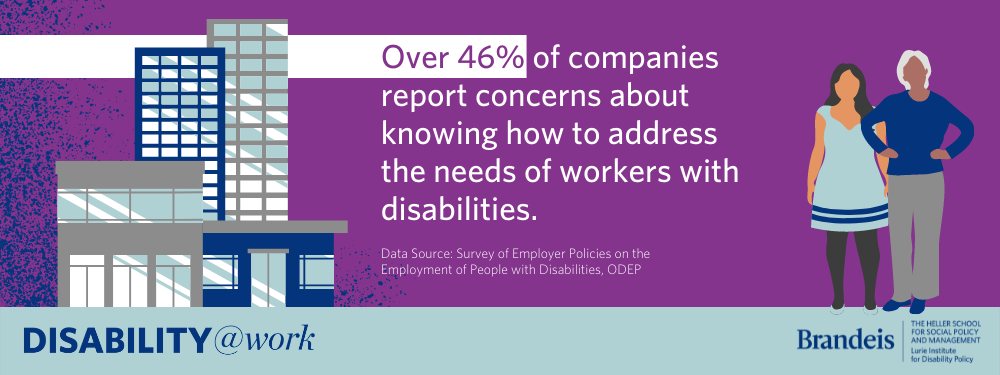
I Didn’t Realize I Needed a Schedule Until I Didn’t Have One Anymore
Anonymous Contributor*
I am someone who has not been diagnosed, but very likely has ADHD or some other form of executive function related disability. As a result, there are many aspects of remote work that were especially impacted for me, in ways that I often only later realized may have been related to ADHD.
During a large part of the past year, I was working remotely in a position where I did not have a set schedule, only weekly meetings to discuss what I had accomplished in the past week. I usually also had to set for myself what my tasks to accomplish for the next meeting would be. This turned out to be difficult, not because I couldn’t do the tasks, but because when I was left to set my own schedule it invariably ended up quite bad (which made things worse).
On nights where I was able to get work done, I would not be able to get myself to start working until 2 AM. Before then everyone else in my household would be awake and moving around, so it was harder to concentrate. I would work from then until noon usually, and sleep after. I found it hard to find a schedule that would allow me to get enough sunlight, if any at all. On other days, I couldn’t get myself to get any work done at all, which I knew would just mean another night later in the week where I would not get to sleep.
A large part of what made things difficult for me is that I had grown used to, or possibly even required, routine in my life. COVID and a flexible work schedule threw that out of whack. In the past, when I’d worked in an office and had my own desk there, I was able to recognize the time I spent at the desk as “work time” and in general be productive, but working from home with the same desk for recreation and work became much more challenging. Compounding this is the fact that for a while I did not have an explanation for why I could not for the life of me begin to do work.
Another example, that I realized later could have an explanation, was that I could not manage to work when my door was open, because my desk was facing the door and I could see out into the hallway and it proved to be too distracting. One day my door was propped open because there was a chair being temporarily left there while someone was cleaning their room. I felt ridiculous asking to have the chair put somewhere else because I needed the door closed in order to focus on my work. I don’t think my housemates believed me when I told them that it was impossible for me to work with the door open like that.
Later in my work experience at the same job, our weekly scheduled meetings fell to the wayside and instead became scheduled haphazardly. I lost the one piece of routine that had formerly held my weeks in some semblance of order. The other issue is that I did not realize the importance that having some form of schedule had for me until I didn’t have it anymore. At that point I wasn’t sure how to ask for it back. I felt silly having to be like “we need to schedule our next meeting at the end of every meeting, otherwise I won’t be able to keep track of it,” but once we started doing that again it worked and things clicked again, at least a little. There would be occasional lapses where we’d miss scheduling a meeting, and I would be tossed back into the tumults of anxiously avoiding my emails but also knowing that I’d have to open them.
Piecing together that things aren’t just laziness but have an explanation has helped, because it means that often there are things that I can do or ask others to do that will help me. It also helps knowing that there are others who experience similar things, and that I can use their experiences and what works for them to help figure out techniques that will work for me as well. Now that I understand my own experiences, I will hopefully be better able to advocate for myself in the workplace.
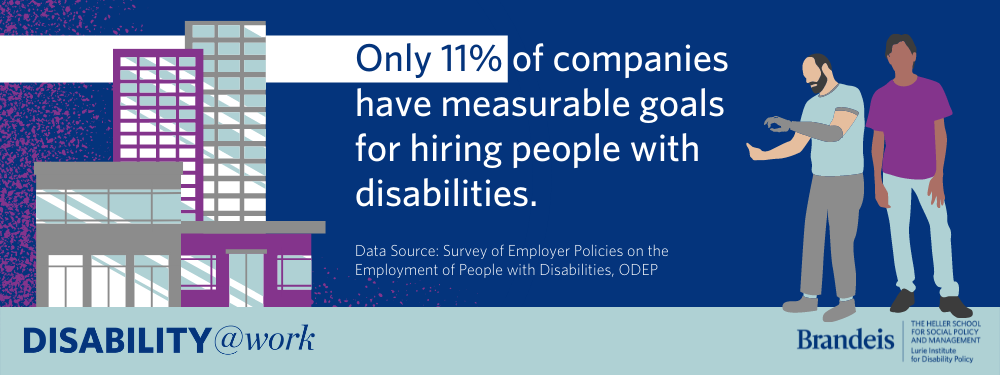
We Need to See It’s Okay to be Disabled
Anonymous Contributor*
Why hello there, blog reader! I’m a white, queer, disabled woman. When people look at me, they see a young white woman. My other identities aren’t necessarily “visible.” I know many disabled folks who can’t necessarily avoid disclosing their disability, and that changes their experience at work. In my case, I usually wait until I cannot go without an accommodation, or I see other folks with disabilities being included, before I mention my disability.
Inclusion is a key word. Where I work, there’s a culture of inclusion—not just accommodation, inclusion. That difference is important. Our public facing work is inclusive too. That’s huge. It’s one thing to say “we want to hire people with disabilities.” It’s quite another to say, “we consider people with disabilities a key stakeholder in our work and will ensure that our website etc. is accessible.” I didn’t feel comfortable talking about my disabilities until I saw the effort that my group was making to ensure that everything we produced and published was accessible.
I would not be able to access important treatment for my disability if my employer didn’t have a strong understanding of what disability actually is. I need to clock my part-time hours so I can have doctor’s appointments in the middle of the day. I need to stop working and take breaks more often. If I were working somewhere that I did not feel safe disclosing my disability, I would have to choose between my health and my work; my health and my income. Instead, I feel that my boss trusts me to get the work done on my schedule, and helps me prioritize what is most important before I run out of energy.
It’s funny, because every person I know, disabled or not, is not good at something. They play to their strengths and work on teams that, together, have the skills to get the project done. However, once disability comes into play, it feels like there are different standards.
In previous jobs, I’ve felt immense stress that I was underperforming, or that if I mentioned my disability too much or had to go to too many doctor’s appointments, I would be passed up for opportunities or even met with punitive action. This stress aggravated my conditions and decreased my productivity. Perhaps for this reason, disability and work are tied quite closely for me. My disability shows up when I work too intensely or too fast. Managing my disability means managing how and when I do work. These two aspects of my life cannot be separated.
My experience is not uncommon. In the U.S., something like 1 in 4 people have a disability. I know many folks who have disabilities (by definition, at least), but do not identify as disabled. For a while, I did not identify as disabled. I’ve noticed that this is common, and I think it speaks to internalized ableism and lack of representation in the workplace. We need to see that it’s okay to be disabled.
Unfortunately, so few employers practice inclusion beyond individual accommodation. So few employers mention disability in their diversity, equity and inclusion statements, their “back to work” plans, or really any communication to employees. Too many conversations about “mental health at work” are centered around employee “stress” impacting productivity and fail to include any mention of folks with chronic mental health conditions. New “open office” layouts are a nightmare for folks who cannot be productive without a calm quiet space. The free company lunch doesn’t have ingredient labels. The Zoom meeting doesn’t have captions. I could go on…, but basically, for disabled folks to truly have access, it needs to be part of the culture, not just an individual accommodation.
Perhaps ironically, it is the disabled community that holds so many of the answers to problems in the workplace today. How do we include folks working remotely? How do we manage concerns about spreading disease? How do we take care of ourselves in a crisis? To improve workplace culture for everyone, people with disabilities have to be part of leading that conversation. (I mean compensated leadership, by the way. Our knowledge is valuable.).
My experience as a disabled person, as a queer person, and as a woman influence my work, and I think that’s a good thing. I prioritize inclusivity, and consider it at the beginning of projects, not as an afterthought. Quite frankly, a connection to the disabled community is rare in many organizations, and I’d consider my knowledge and experience a strength.
Of course, my whiteness influences my work too, and it's up to me to understand how. White supremacy harms marginalized folks most of all, but ultimately white supremacy and colonialism harm everyone in society. If I'm not trying my darnedest to help dismantle it, then I'm betraying my other identities, and my peers in those circles.
I chose to remain anonymous here for a couple reasons. My identity as a disabled, queer person is constantly evolving. I do not want to share this part of my life with the vast public just yet. The other reason is a very necessary attempt to avoid discrimination in future employment opportunities.
Anyway, thanks for reading. :)
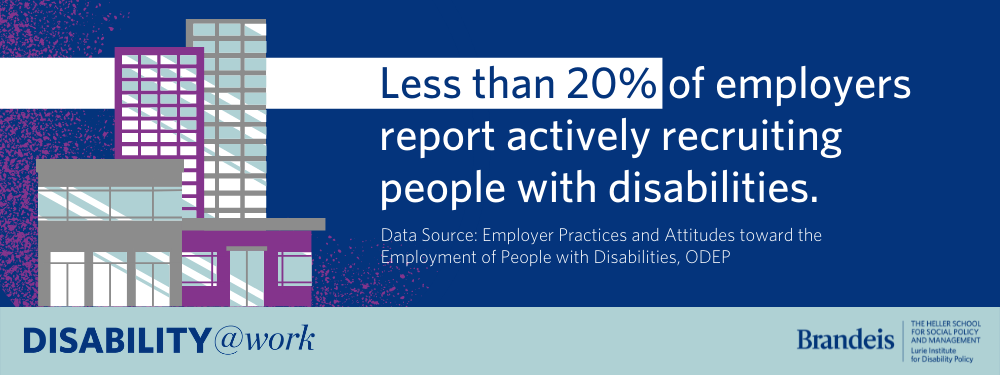
This is What People Mean When They Say Disability
R. Quinn Weiner (they/them/theirs)
My disability first presented itself when I was in high school, but I didn't realize it was a disability until I graduated and got a full-time job. Though plenty of things have triggered my migraines, (an earthquake, a car accident, and the hormonal changes associated with going on testosterone, to name a few), most of them are caused by stress.
As a high school student and undergraduate, that made the process of preventing them a pretty simple one; I quickly learned to stay organized, set healthy boundaries, and take breaks when I needed them--all steps so simple and universal that they don't seem like disability self-accomodation, but rather like normal forms of self-care. If I did get a migraine, my treatment plan was simply to rest. Even if it had to be in a dark, quiet, screen-free room, once I had some pain meds, the forced time off wasn't such a bad experience.
My migraines were bad enough that I registered with my university's accessibility office, but that was an easy process that got me simple accommodations, mostly comprised of excused absences. Frequently enough, the very fact that I could take a day off when necessary reduced my stress to the point that I didn't need to use my accommodations at all. I once wrote to a professor to say I wasn't coming to class the following day, took the evening off, woke up migraine-free, and went to class as usual.
I wasn't disabled and didn't have a disability—I just had migraines. The organization and time management skills I developed to avoid migraines have served me well.
Having recently graduated undergrad, I now work full-time at a university during the day and attend graduate school in the evenings. I am firmly in the adult world, with bills and housework and relationships to maintain—with the added bonus of homework, all during a pandemic and while visibly trans. As you might imagine, I get a good number of stress-related migraines.
In the adult world, however, these migraines are no longer just a slightly more pressing reason to take care of myself, nor a convenient indicator of when I need to take a break. I was a month into my full-time position when I took a sick day for a migraine for the first time. I had felt the migraine the previous day, getting worse with time as I continued working on my computer, but rather than sleeping it off, I only woke up feeling worse. The damage had been done, and the migraine was there. I could barely glance at my phone to check if another hour had mercifully melted away, let alone jump on a Zoom meeting. I couldn't utilize the time to do a reading or write a forum post for class. I couldn't play a video game or read a book to relax. I couldn't even sweep the floor without becoming too dizzy to stand.
I was thoroughly disoriented, but I had enough clarity of mind to realize that this is what people mean when they say disability. Disability, as in disability accommodation. As in disability disclosure. As in the Americans with Disabilities Act. As in disability leave. As in disability payments. The word carried so much, and I had absolutely no idea what to do with it or how it existed in relation to me, the very same me who just yesterday hadn't considered themselves to have a disability.
I had the same accommodations in graduate school that I had in undergraduate, but at my job, the job which had me working through my early migraine symptoms, I had no idea what I had, aside from 19 more sick days. That migraine and the realization it brought was over a month ago, and I still don't know what I have. I am a worker completely unknowing of my rights.
HR had explained a bit to me during my onboarding, about long-term disability arrangements and such, but they were always framed for an able audience who might one day gain very obvious and objective disabilities, disabilities which would draw clean lines around their work capabilities. I had some vague notion that it was illegal to fire me based on my disability, but that extreme was of little comfort to my fog-addled mind.
I would love to cut right here to a section where I explain every right that I learned I have as an employee, probably followed by an analysis of the ways these rights aren't fully adequate or allow people to fall through the cracks, and perhaps concluding with a few cliched lines about reforming the legislature around disability to be more effective, or about making the world more accessible. I can't cut to this paragraph, because I still don't know.
A month has passed since that migraine, but I’m still a full-time employee and full-time graduate student, and if there's one thing people with migraines aren't known for, it's having an excess of time and energy to dedicate to intense and stressful tasks—even if those tasks are as important as knowing my legal protections.
So, rather than list my (and, potentially, your) rights, I'll ask you: What would it mean for you as a worker if you woke up tomorrow with a disability? What are your rights around disclosure, and when and why might it be advantageous or dangerous to disclose your disability? What does a disability which is not a single, continuous, long-term disability mean for your sick days, for your working conditions, or for your employment in general? How do you know your answers, and considering anyone can become disabled, or even realize they already are, why don't I know, and why doesn't everyone?
I appreciate having a disability. I'm happy to hold my identities, and I value my experiences. But sitting in the dark with that migraine, alone and in pain, knowing my rights and protections under the law would have been the difference between disoriented panic, and clarity and relief.
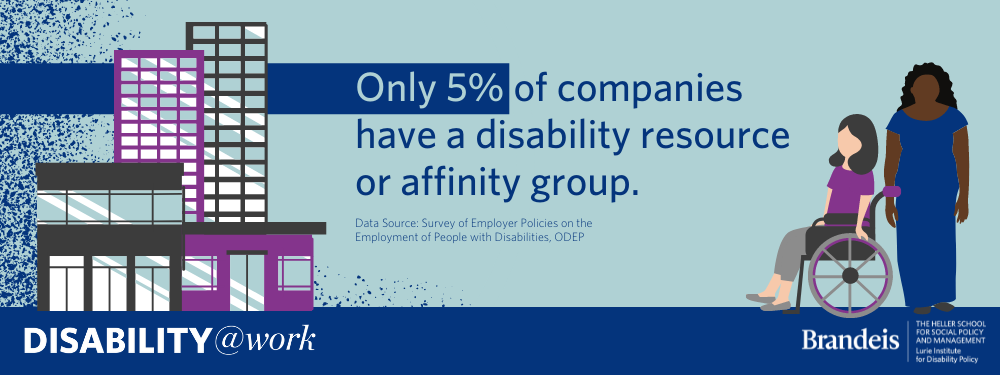
I Want to Talk About ADHD...
Kyle Richard
Resources recommended by Kyle:
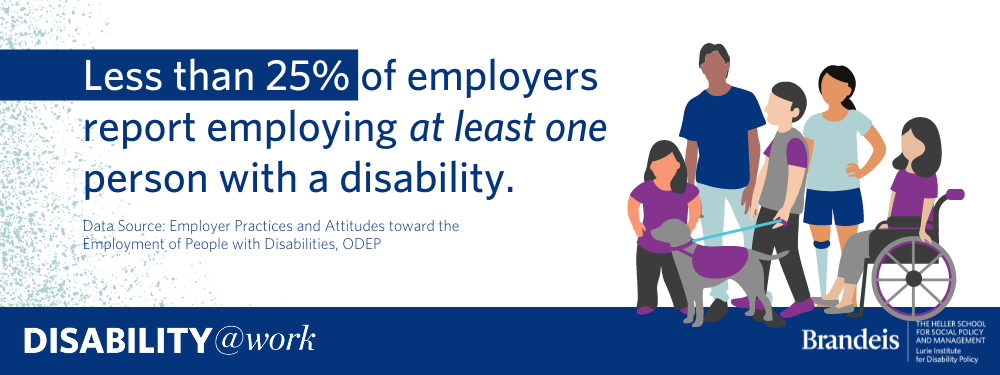
How My Being Autistic Affects the Way I Work
Finn Gardiner
Hi! I’m Finn Gardiner, the Lurie Institute’s communications specialist. Although I’ve been openly autistic for most of my adult life, I haven’t talked as much about how my being autistic affects the way I work. (On top of being autistic, I also have some ADHD-like traits, though I’ve never received a formal diagnosis.) I see myself primarily as neurodivergent—that is, my brain works differently from most people’s, and it’s just a fact of life. Specifically, I have strong sensory impressions, a highly variable attention span, intense interests, and a need for complex work that involves analysis, synthesis, and genesis. There are benefits as well as drawbacks, and it’s important for me to acknowledge both to work effectively.
Sensory impressions
Imagine what it would feel like if the words, numerals, ideas, and other symbols that you hear and read had feelings, shapes, sounds, emotional associations, historical references, textures, personalities, and smells—and you feel them almost as acutely as you do your normal senses. That’s how I think. My sensory reactions are connected intimately with my ability to draw inferences, interpret the world, and understand ideas. When I learn things, I don’t just memorize them; I feel them, taste them, touch them. This is a form of synaesthesia, or the simultaneous perception of more than one sense, including sight, sound, hearing, taste, smell, emotion, and touch. I process abstractions—especially language—as concrete sense data. For example, when I hear speech, I see the written words in my head along with a visual image of the subject of the conversation, such as a person, a place, or an event. I use and understand figurative language, but I’ll simultaneously get an image of the metaphor in my head, too, so if someone says “raining cats and dogs,” I know that they just mean “raining a lot,” but I also imagine cats and dogs falling out of the sky. If I hear someone saying “stakeholder engagement,” I imagine someone holding a stake and proposing marriage. As a result, I need language to be clear, precise, logical, correct, and honest—I want what I read and write to bring forth the right images, sounds, textures, and tastes in my head.
On the one hand, my awareness of these subtleties makes me a more effective writer and editor—after all, if I’m tasting and smelling errors, I’ll catch them easily, and my visualizations help me avoid mixed metaphors and unintentional nonsense. And it helps me as a designer and typographer, too: since I feel the relationship between layout and content, I understand how to make the layout serve the content without treating the layout as an afterthought or distracting people by using a layout that makes it harder for them to read.
On the other hand, I’m easily distracted by bad typography, misspelled words, punctuation errors, redundant writing, ungrammatical sentences, and poorly matched patterns, all of which can evoke negative sensory impressions. I’ll also start wondering why the writer made the errors in the first place, where they went to school, how much they’ve thought about their writing, how much effort they put into communicating with other people in general, how aware they are of what they’re saying and how others may react to it. Mostly, though, I just feel bad for the writer and want to help.
But even with the negative sensory impressions I get from poor writing and design, I wouldn’t change the way I react to language for the world. My perceptions help me avoid impersonal, illogical, substandard, confusing, ugly, bureaucratic, and inhumane language—and help me write plainly, clearly, and accurately. I’m also able to help others learn how to write more effectively. It’s a trade-off, but it’s one I’m willing to deal with—most of the time, anyway. To reset after reading a lot of painful writing, I’ll get out a book that gives me better sensory impressions.
Interest, focus, and complexity
I thrive on novelty, complexity, and interest—and struggle to focus on tedious tasks that focus primarily on rote learning or task execution. Some autistic people excel at rote tasks, but I’m not one of them. I’m very nonlinear, even though I can produce logical work as long as I can do it out of sequence. For example, I’m writing this essay out of order. I don’t start with the beginning, go to the middle, and then write a conclusion; I usually write inside-out, starting with the middle. My thinking works more like a mind map or a flowchart than a timeline, so it’s hard for me to compress my thoughts. People who think more linearly are often surprised that I can’t focus on apparently simple tasks. I’ve often struggled in the past—especially in elementary and middle school—because I couldn’t explain how my brain worked until I was an adult. (The tasks they see as simple are actually really hard for me. I suffered in math classes for years because teachers expect you to learn everything by rote before they explain how different operations work, but that’s not how I learn.) If I’m using a program or website that forces me to work step by step, then I’m likely to get annoyed—I want to understand how the whole thing works and reverse-engineer the steps instead. I’m glad to work somewhere where I can talk more freely about how I process information so that we can delegate tasks appropriately. I also need to take frequent breaks to shift tasks if I start feeling my attention starting to wander—or block off time to hyperfocus on a specific task that I need to rank more highly, depending on the situation.
I also have a lot of intense interests that can keep me occupied for days, months, or even years at a time. Sometimes they can seem arcane—the correct use of apostrophes, different types of fonts and their designers, the language that error messages use—but they’re usually part of a broader network of interests. Underlying all these seemingly disparate interests is a fascination with the symbols we use to share our feelings, thoughts, and ideas with each other. How can we communicate the most effectively with each other? How do we explain difficult concepts without breaking others’ brains? How do we talk about scientific research to nonspecialists, people with cognitive disabilities, and policymakers?
Fortunately, the work I do at the Lurie Institute builds on those strengths—as the communications specialist, I get to work on several projects at once, use different methods to break down complex scientific research for nonspecialists, and see the whole picture at once, rather than confining myself to a single project at a time, step by step, all in order. It’s taken me quite a while to figure out how to use my strengths, but I’m glad I have.
(partially adapted from content on my personal blog)
